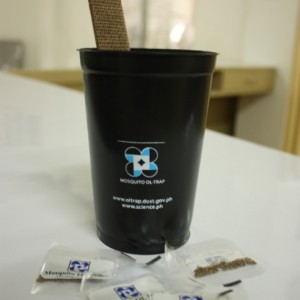Pakistan, Nepal want PH’s dengue traps
MANILA, Philippines—The ingenious ovicidal/larvicidal (OL) trap devised by Filipino scientists has attracted the interest of two other nations fighting the scourge of the mosquito-borne dengue hemorrhagic fever.
An official of the Department of Science and Technology (DOST) said Pakistan and Nepal had formally communicated their interest to adopt the device to curb the transmission of dengue from mosquitoes.
“Pakistan and Nepal have written, asking for a transfer of technology but we have intellectual property rights to settle. We also want to apply this in our country first,” said Dr. Nuna Almanzor, director of the DOST Industrial Technology and Development Institute.
The DOST introduced the antidengue OL traps in 2011.
Effective on pilot testing
Based on pilot testing in select barangays (villages) nationwide, the OL trap has been shown to be effective in curbing the population of the Aedes aegypti mosquito whose adult females carry the deadly dengue virus.
Dengue has claimed at least 193 lives from Jan. 1 to June 8 this year, with at least 42,207 stricken by the virus during the period.
Two years since its launch, the effective yet simple contraption against mosquitoes has been made available commercially.
The OL trap kit simply consists of a black cup and a popsicle stick-like strip of lawanit (coconut husk wall paneling) that is half-immersed in an organic solution that can destroy mosquito eggs and larvae.
When the kit is placed in areas known to be frequented by mosquitoes, the scent of the solution attracts female Aedes aegypti mosquitoes to lay their eggs on the lawanit stick.
While the trap does not kill the mosquito, it kills the hundreds of eggs it lays.
The trap’s crucial component is the pepper-based solution developed by leading Filipino entomologists and DOST scientists.
The DOST has licensed a manufacturer and a marketer and distributor for the OL trap kits.
Houses should have OL traps
Almanzor said a packet of the specially formulated pellets costs about P4 each. A packet is good for about one week’s use before it has to be replaced.
The DOST has advised that each house should have at least four traps, two placed inside the house and two placed outside.
Almanzor said they hoped that the OL trap pellets would eventually be made available even in sari-sari stores.
She said they needed to find more interested parties who would invest in the equipment needed to mass-produce the pellets.
“We are very much willing to transfer the technology,” she said.
The DOST also pointed out that the OL trap was only one way to prevent the spread of dengue, as the primary preventive measure still involves keeping one’s surroundings clean and destroying mosquito breeding sites such as uncovered containers that collect clear, stagnant water.
Scientists are still working to improve the OL trap and find better ovicide and larvicide solutions.
